Research Report on Employee Motivation and Organizational Behavior
VerifiedAdded on 2022/08/18
|16
|3185
|499
Report
AI Summary
This report examines the intricate relationship between personality, individual differences, employee attitudes, job satisfaction, and organizational behavior. It explores how these elements impact employee motivation within the workplace. The report delves into the analysis of the impact of personality and individual differences, as well as employee attitudes and job satisfaction on motivation at work and to the organisational behaviour. The report also provides a detailed overview of key theories such as the Hertzberg Two Factor Theory, Maslow's Hierarchy of Needs, and McClelland's Theory of Needs, offering insights into how these models explain motivation and its connection to employee performance. The report also includes a literature review on the subject and provides a discussion on the theories for personality on motivation and organizational Behavior.
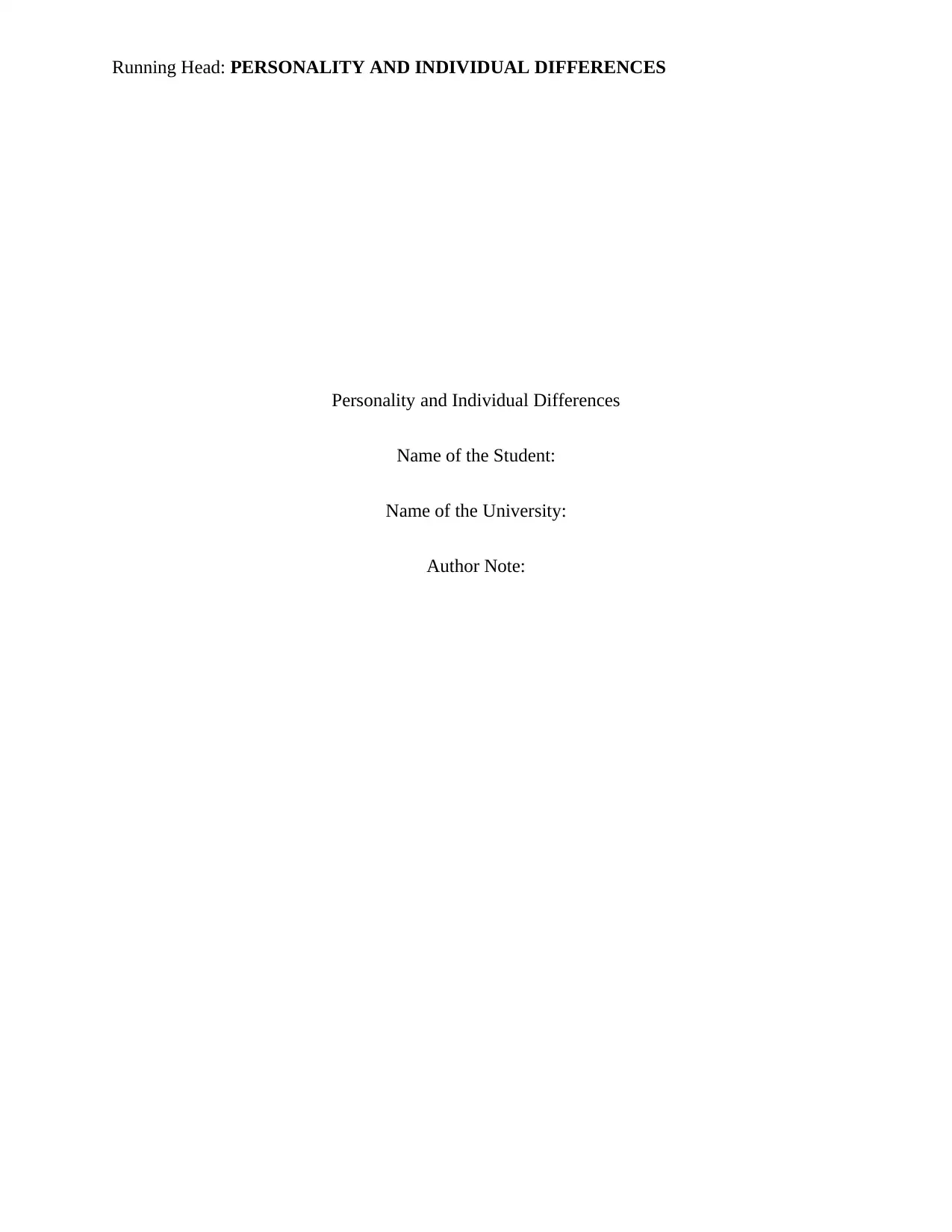
Running Head: PERSONALITY AND INDIVIDUAL DIFFERENCES
Personality and Individual Differences
Name of the Student:
Name of the University:
Author Note:
Personality and Individual Differences
Name of the Student:
Name of the University:
Author Note:
Paraphrase This Document
Need a fresh take? Get an instant paraphrase of this document with our AI Paraphraser
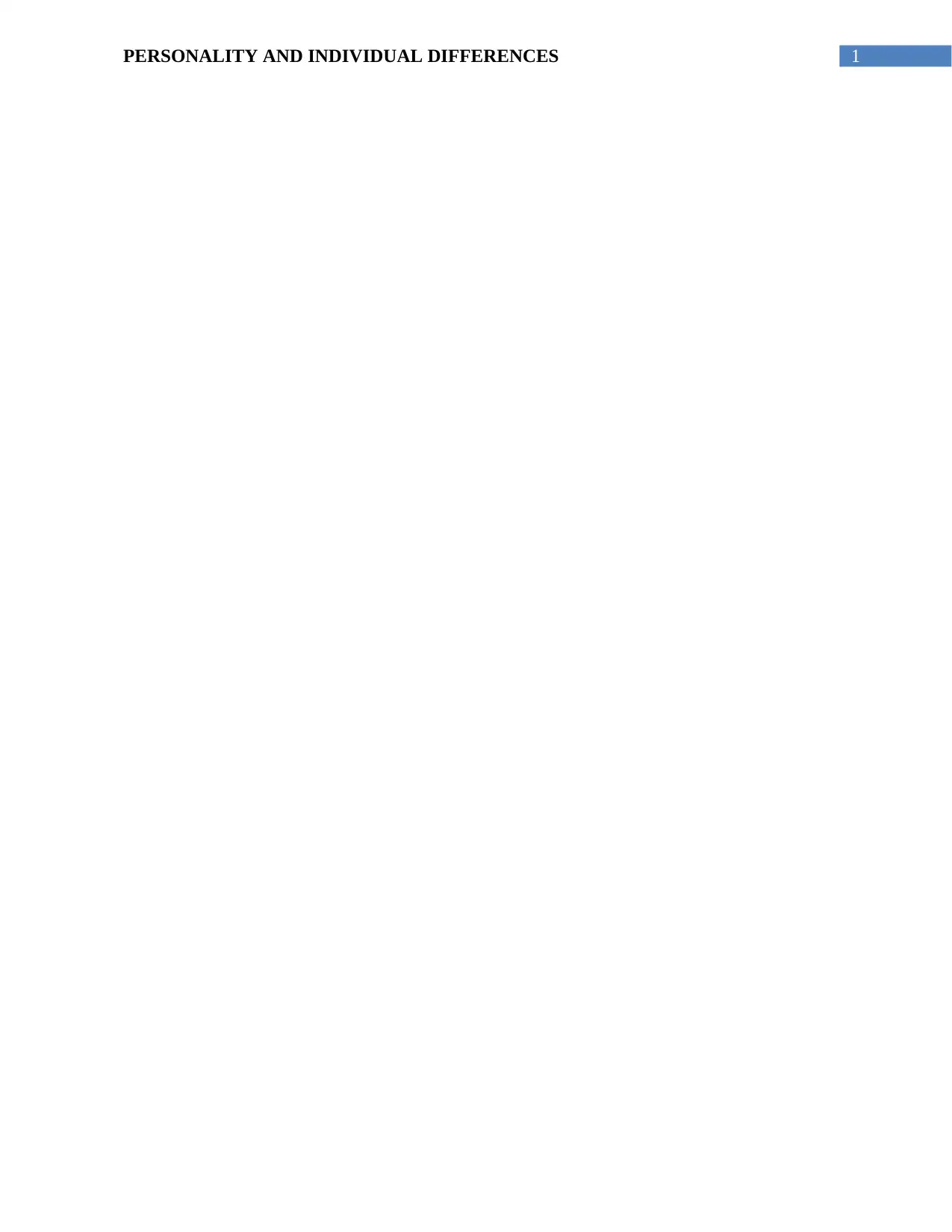
1PERSONALITY AND INDIVIDUAL DIFFERENCES
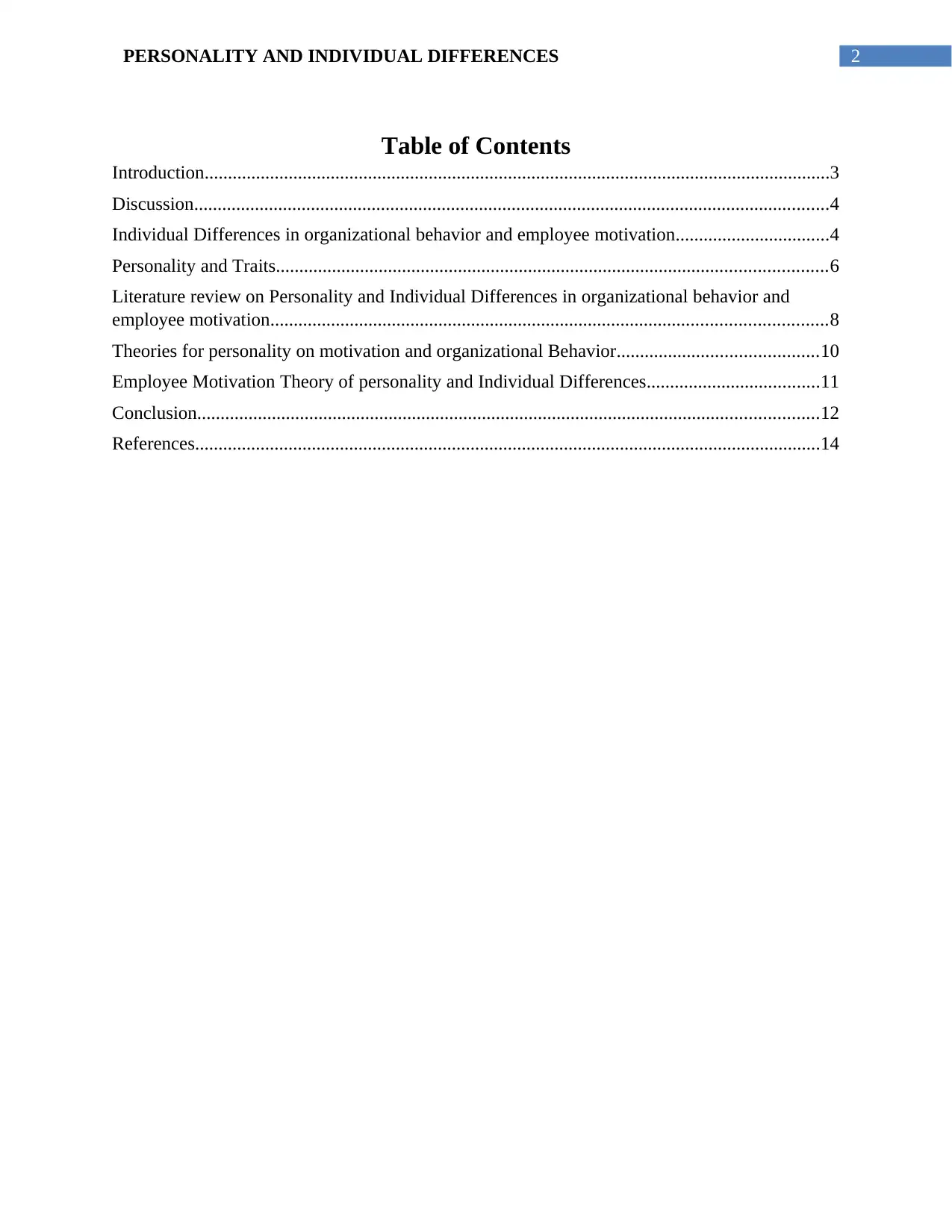
2PERSONALITY AND INDIVIDUAL DIFFERENCES
Table of Contents
Introduction......................................................................................................................................3
Discussion........................................................................................................................................4
Individual Differences in organizational behavior and employee motivation.................................4
Personality and Traits......................................................................................................................6
Literature review on Personality and Individual Differences in organizational behavior and
employee motivation.......................................................................................................................8
Theories for personality on motivation and organizational Behavior...........................................10
Employee Motivation Theory of personality and Individual Differences.....................................11
Conclusion.....................................................................................................................................12
References......................................................................................................................................14
Table of Contents
Introduction......................................................................................................................................3
Discussion........................................................................................................................................4
Individual Differences in organizational behavior and employee motivation.................................4
Personality and Traits......................................................................................................................6
Literature review on Personality and Individual Differences in organizational behavior and
employee motivation.......................................................................................................................8
Theories for personality on motivation and organizational Behavior...........................................10
Employee Motivation Theory of personality and Individual Differences.....................................11
Conclusion.....................................................................................................................................12
References......................................................................................................................................14
⊘ This is a preview!⊘
Do you want full access?
Subscribe today to unlock all pages.

Trusted by 1+ million students worldwide
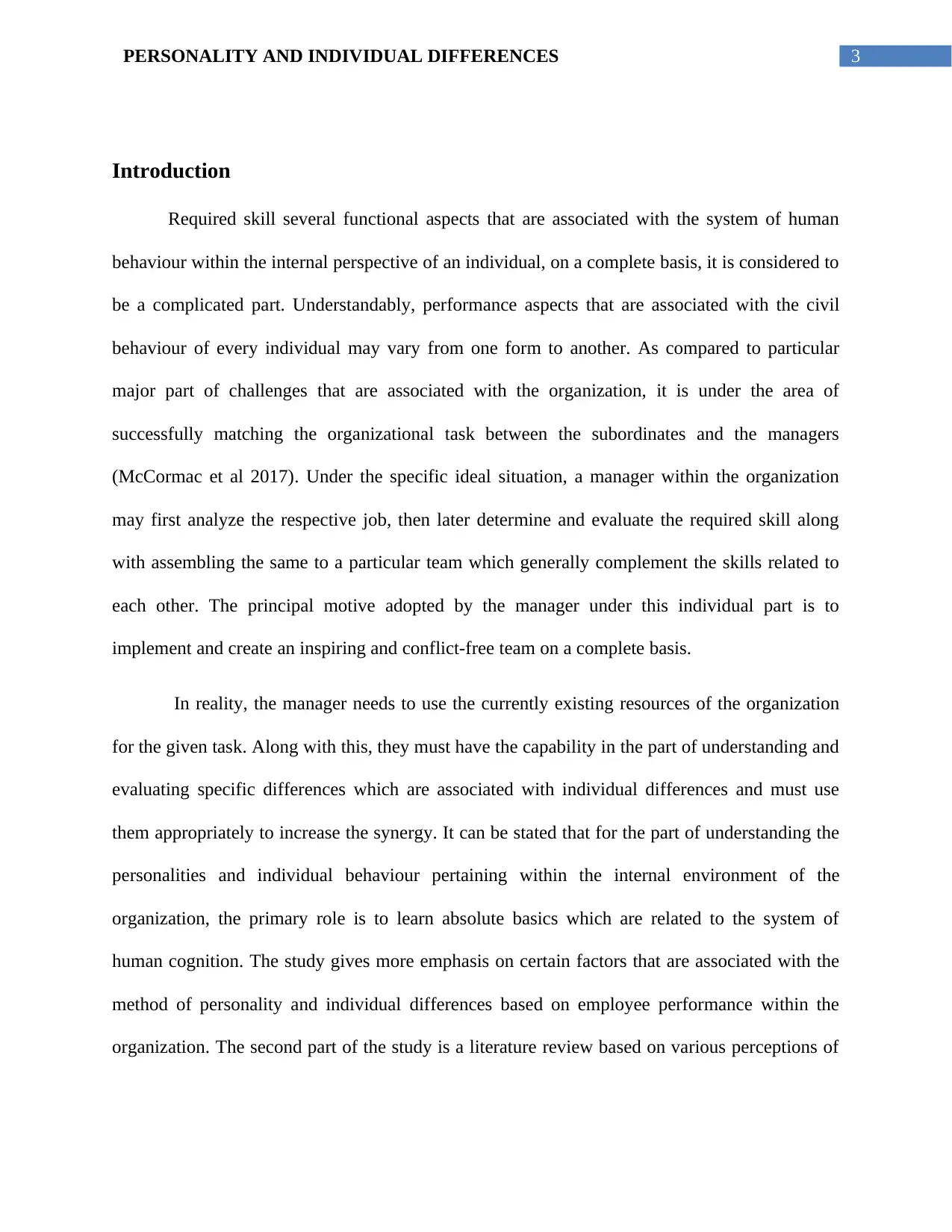
3PERSONALITY AND INDIVIDUAL DIFFERENCES
Introduction
Required skill several functional aspects that are associated with the system of human
behaviour within the internal perspective of an individual, on a complete basis, it is considered to
be a complicated part. Understandably, performance aspects that are associated with the civil
behaviour of every individual may vary from one form to another. As compared to particular
major part of challenges that are associated with the organization, it is under the area of
successfully matching the organizational task between the subordinates and the managers
(McCormac et al 2017). Under the specific ideal situation, a manager within the organization
may first analyze the respective job, then later determine and evaluate the required skill along
with assembling the same to a particular team which generally complement the skills related to
each other. The principal motive adopted by the manager under this individual part is to
implement and create an inspiring and conflict-free team on a complete basis.
In reality, the manager needs to use the currently existing resources of the organization
for the given task. Along with this, they must have the capability in the part of understanding and
evaluating specific differences which are associated with individual differences and must use
them appropriately to increase the synergy. It can be stated that for the part of understanding the
personalities and individual behaviour pertaining within the internal environment of the
organization, the primary role is to learn absolute basics which are related to the system of
human cognition. The study gives more emphasis on certain factors that are associated with the
method of personality and individual differences based on employee performance within the
organization. The second part of the study is a literature review based on various perceptions of
Introduction
Required skill several functional aspects that are associated with the system of human
behaviour within the internal perspective of an individual, on a complete basis, it is considered to
be a complicated part. Understandably, performance aspects that are associated with the civil
behaviour of every individual may vary from one form to another. As compared to particular
major part of challenges that are associated with the organization, it is under the area of
successfully matching the organizational task between the subordinates and the managers
(McCormac et al 2017). Under the specific ideal situation, a manager within the organization
may first analyze the respective job, then later determine and evaluate the required skill along
with assembling the same to a particular team which generally complement the skills related to
each other. The principal motive adopted by the manager under this individual part is to
implement and create an inspiring and conflict-free team on a complete basis.
In reality, the manager needs to use the currently existing resources of the organization
for the given task. Along with this, they must have the capability in the part of understanding and
evaluating specific differences which are associated with individual differences and must use
them appropriately to increase the synergy. It can be stated that for the part of understanding the
personalities and individual behaviour pertaining within the internal environment of the
organization, the primary role is to learn absolute basics which are related to the system of
human cognition. The study gives more emphasis on certain factors that are associated with the
method of personality and individual differences based on employee performance within the
organization. The second part of the study is a literature review based on various perceptions of
Paraphrase This Document
Need a fresh take? Get an instant paraphrase of this document with our AI Paraphraser
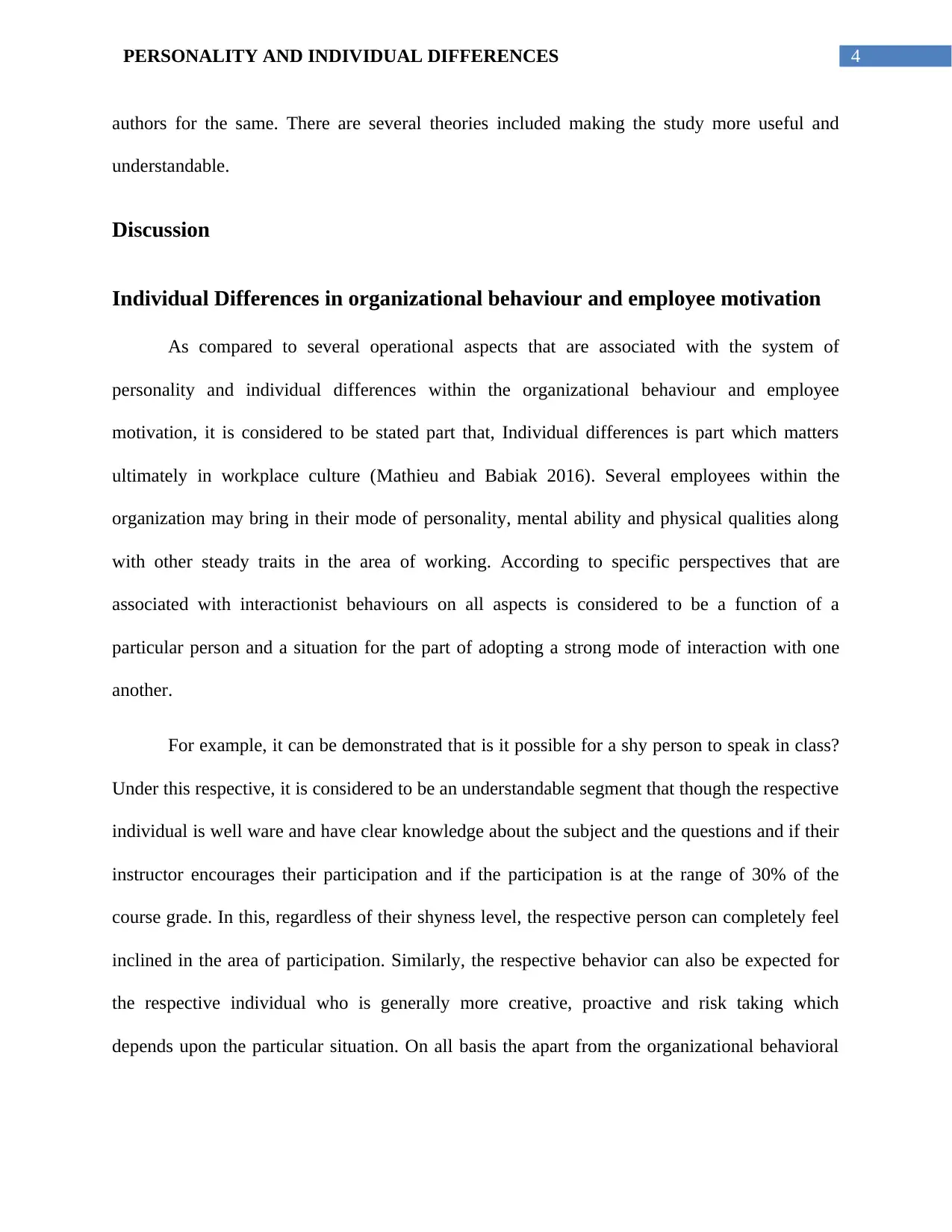
4PERSONALITY AND INDIVIDUAL DIFFERENCES
authors for the same. There are several theories included making the study more useful and
understandable.
Discussion
Individual Differences in organizational behaviour and employee motivation
As compared to several operational aspects that are associated with the system of
personality and individual differences within the organizational behaviour and employee
motivation, it is considered to be stated part that, Individual differences is part which matters
ultimately in workplace culture (Mathieu and Babiak 2016). Several employees within the
organization may bring in their mode of personality, mental ability and physical qualities along
with other steady traits in the area of working. According to specific perspectives that are
associated with interactionist behaviours on all aspects is considered to be a function of a
particular person and a situation for the part of adopting a strong mode of interaction with one
another.
For example, it can be demonstrated that is it possible for a shy person to speak in class?
Under this respective, it is considered to be an understandable segment that though the respective
individual is well ware and have clear knowledge about the subject and the questions and if their
instructor encourages their participation and if the participation is at the range of 30% of the
course grade. In this, regardless of their shyness level, the respective person can completely feel
inclined in the area of participation. Similarly, the respective behavior can also be expected for
the respective individual who is generally more creative, proactive and risk taking which
depends upon the particular situation. On all basis the apart from the organizational behavioral
authors for the same. There are several theories included making the study more useful and
understandable.
Discussion
Individual Differences in organizational behaviour and employee motivation
As compared to several operational aspects that are associated with the system of
personality and individual differences within the organizational behaviour and employee
motivation, it is considered to be stated part that, Individual differences is part which matters
ultimately in workplace culture (Mathieu and Babiak 2016). Several employees within the
organization may bring in their mode of personality, mental ability and physical qualities along
with other steady traits in the area of working. According to specific perspectives that are
associated with interactionist behaviours on all aspects is considered to be a function of a
particular person and a situation for the part of adopting a strong mode of interaction with one
another.
For example, it can be demonstrated that is it possible for a shy person to speak in class?
Under this respective, it is considered to be an understandable segment that though the respective
individual is well ware and have clear knowledge about the subject and the questions and if their
instructor encourages their participation and if the participation is at the range of 30% of the
course grade. In this, regardless of their shyness level, the respective person can completely feel
inclined in the area of participation. Similarly, the respective behavior can also be expected for
the respective individual who is generally more creative, proactive and risk taking which
depends upon the particular situation. On all basis the apart from the organizational behavioral
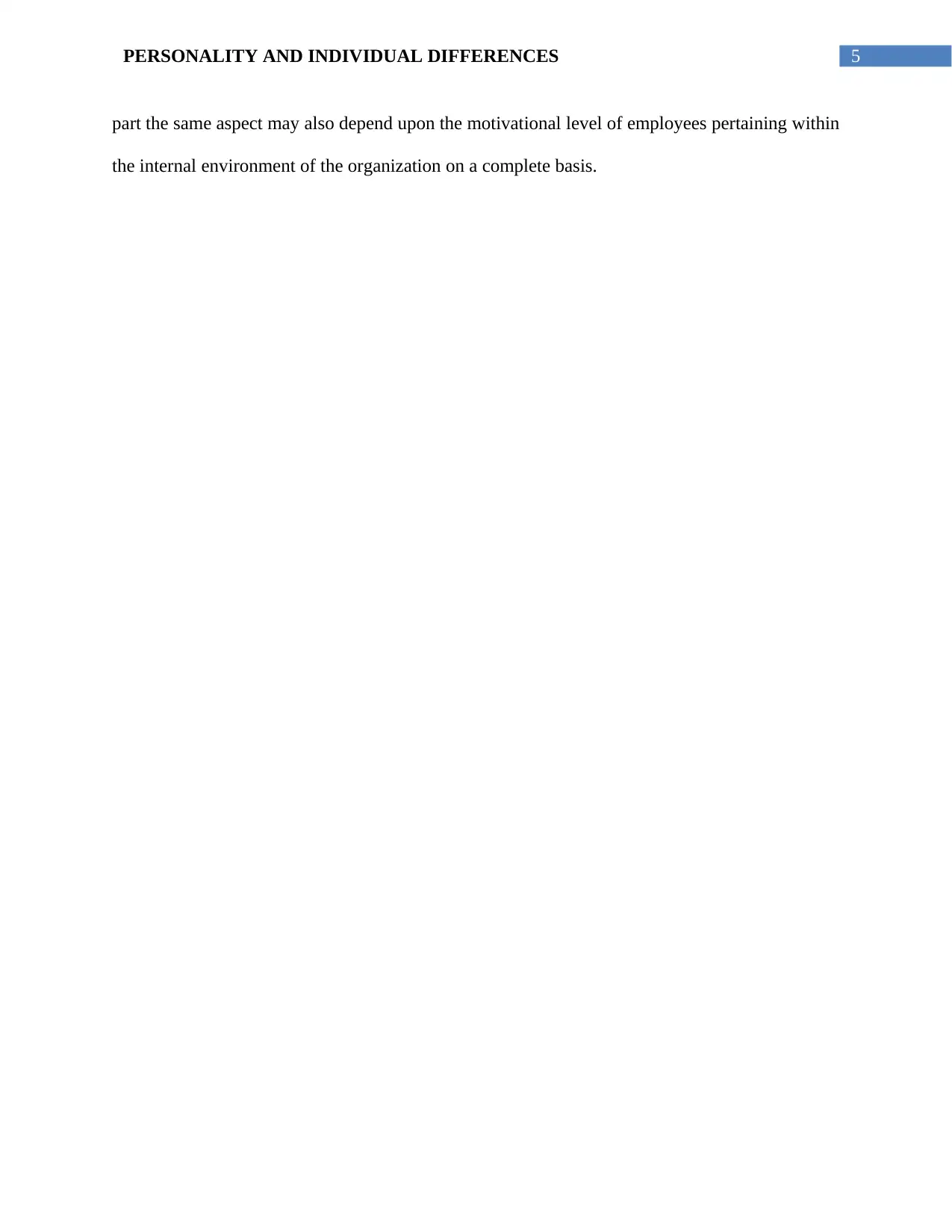
5PERSONALITY AND INDIVIDUAL DIFFERENCES
part the same aspect may also depend upon the motivational level of employees pertaining within
the internal environment of the organization on a complete basis.
part the same aspect may also depend upon the motivational level of employees pertaining within
the internal environment of the organization on a complete basis.
⊘ This is a preview!⊘
Do you want full access?
Subscribe today to unlock all pages.

Trusted by 1+ million students worldwide
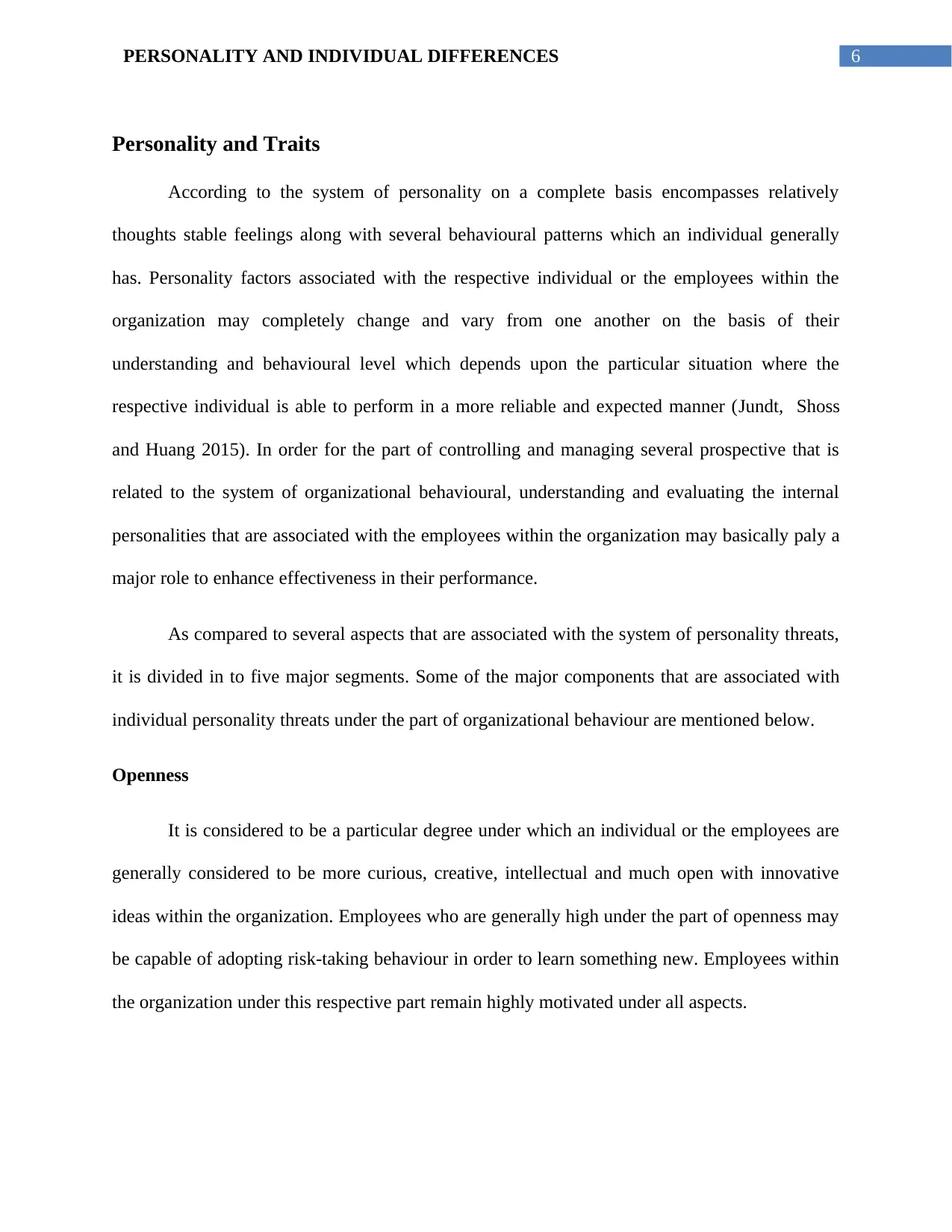
6PERSONALITY AND INDIVIDUAL DIFFERENCES
Personality and Traits
According to the system of personality on a complete basis encompasses relatively
thoughts stable feelings along with several behavioural patterns which an individual generally
has. Personality factors associated with the respective individual or the employees within the
organization may completely change and vary from one another on the basis of their
understanding and behavioural level which depends upon the particular situation where the
respective individual is able to perform in a more reliable and expected manner (Jundt, Shoss
and Huang 2015). In order for the part of controlling and managing several prospective that is
related to the system of organizational behavioural, understanding and evaluating the internal
personalities that are associated with the employees within the organization may basically paly a
major role to enhance effectiveness in their performance.
As compared to several aspects that are associated with the system of personality threats,
it is divided in to five major segments. Some of the major components that are associated with
individual personality threats under the part of organizational behaviour are mentioned below.
Openness
It is considered to be a particular degree under which an individual or the employees are
generally considered to be more curious, creative, intellectual and much open with innovative
ideas within the organization. Employees who are generally high under the part of openness may
be capable of adopting risk-taking behaviour in order to learn something new. Employees within
the organization under this respective part remain highly motivated under all aspects.
Personality and Traits
According to the system of personality on a complete basis encompasses relatively
thoughts stable feelings along with several behavioural patterns which an individual generally
has. Personality factors associated with the respective individual or the employees within the
organization may completely change and vary from one another on the basis of their
understanding and behavioural level which depends upon the particular situation where the
respective individual is able to perform in a more reliable and expected manner (Jundt, Shoss
and Huang 2015). In order for the part of controlling and managing several prospective that is
related to the system of organizational behavioural, understanding and evaluating the internal
personalities that are associated with the employees within the organization may basically paly a
major role to enhance effectiveness in their performance.
As compared to several aspects that are associated with the system of personality threats,
it is divided in to five major segments. Some of the major components that are associated with
individual personality threats under the part of organizational behaviour are mentioned below.
Openness
It is considered to be a particular degree under which an individual or the employees are
generally considered to be more curious, creative, intellectual and much open with innovative
ideas within the organization. Employees who are generally high under the part of openness may
be capable of adopting risk-taking behaviour in order to learn something new. Employees within
the organization under this respective part remain highly motivated under all aspects.
Paraphrase This Document
Need a fresh take? Get an instant paraphrase of this document with our AI Paraphraser
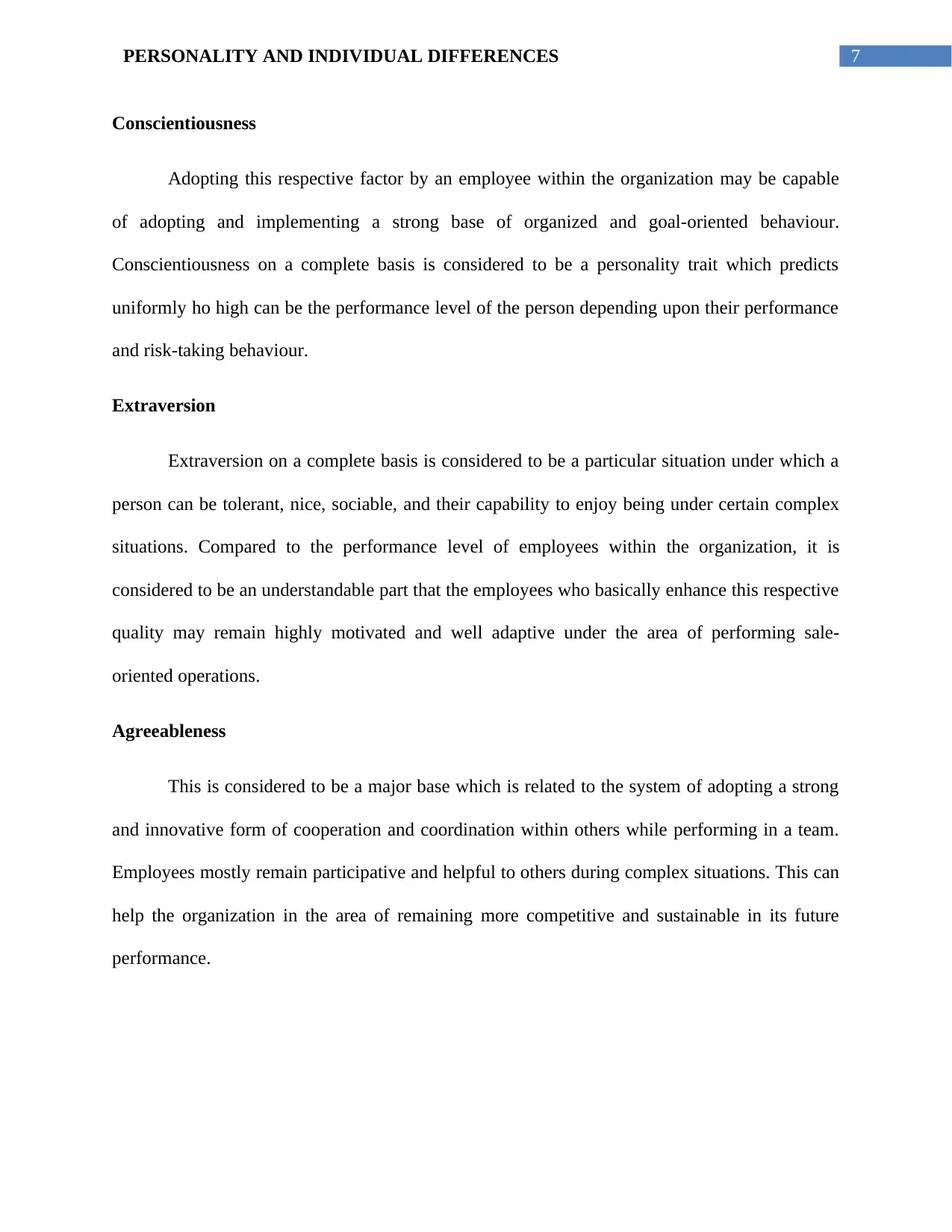
7PERSONALITY AND INDIVIDUAL DIFFERENCES
Conscientiousness
Adopting this respective factor by an employee within the organization may be capable
of adopting and implementing a strong base of organized and goal-oriented behaviour.
Conscientiousness on a complete basis is considered to be a personality trait which predicts
uniformly ho high can be the performance level of the person depending upon their performance
and risk-taking behaviour.
Extraversion
Extraversion on a complete basis is considered to be a particular situation under which a
person can be tolerant, nice, sociable, and their capability to enjoy being under certain complex
situations. Compared to the performance level of employees within the organization, it is
considered to be an understandable part that the employees who basically enhance this respective
quality may remain highly motivated and well adaptive under the area of performing sale-
oriented operations.
Agreeableness
This is considered to be a major base which is related to the system of adopting a strong
and innovative form of cooperation and coordination within others while performing in a team.
Employees mostly remain participative and helpful to others during complex situations. This can
help the organization in the area of remaining more competitive and sustainable in its future
performance.
Conscientiousness
Adopting this respective factor by an employee within the organization may be capable
of adopting and implementing a strong base of organized and goal-oriented behaviour.
Conscientiousness on a complete basis is considered to be a personality trait which predicts
uniformly ho high can be the performance level of the person depending upon their performance
and risk-taking behaviour.
Extraversion
Extraversion on a complete basis is considered to be a particular situation under which a
person can be tolerant, nice, sociable, and their capability to enjoy being under certain complex
situations. Compared to the performance level of employees within the organization, it is
considered to be an understandable part that the employees who basically enhance this respective
quality may remain highly motivated and well adaptive under the area of performing sale-
oriented operations.
Agreeableness
This is considered to be a major base which is related to the system of adopting a strong
and innovative form of cooperation and coordination within others while performing in a team.
Employees mostly remain participative and helpful to others during complex situations. This can
help the organization in the area of remaining more competitive and sustainable in its future
performance.
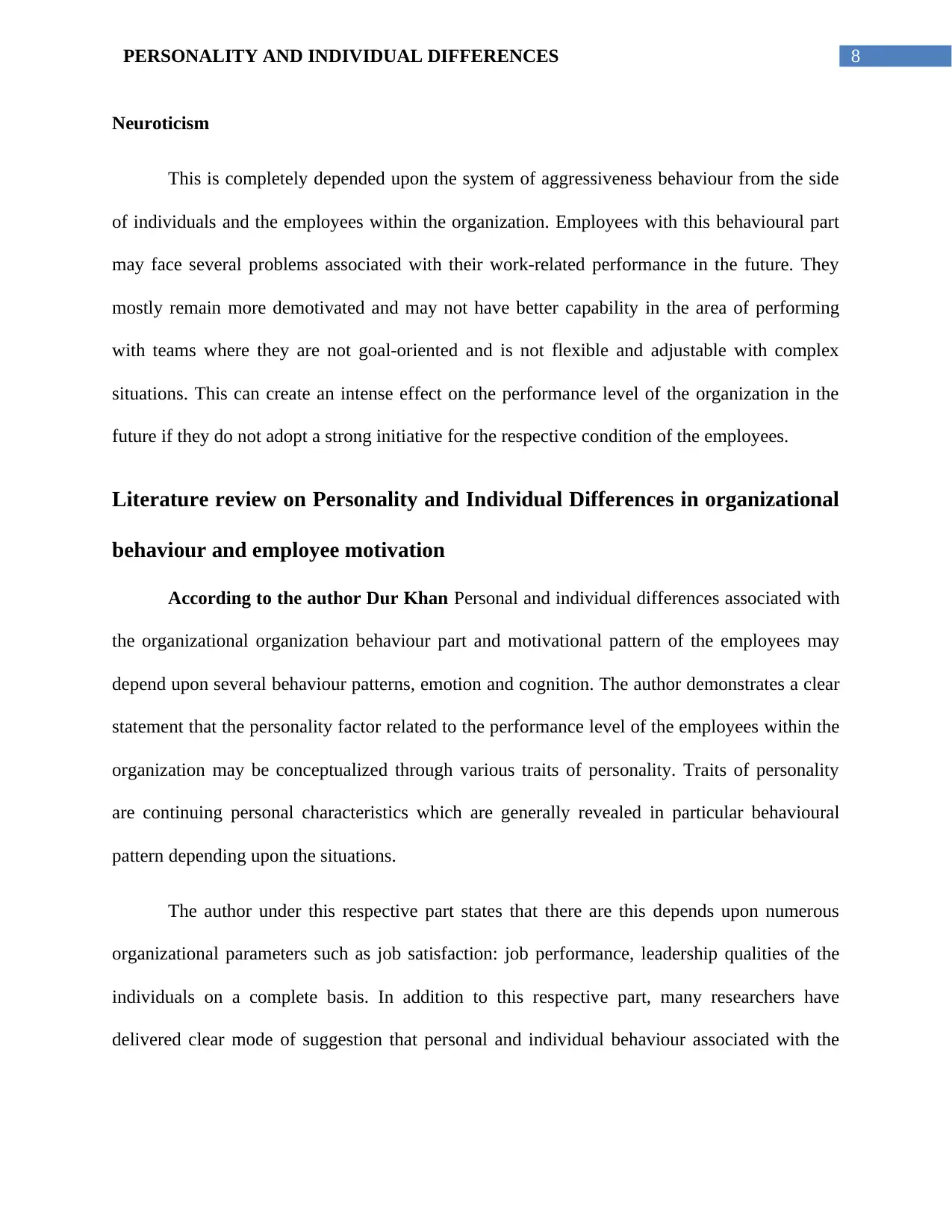
8PERSONALITY AND INDIVIDUAL DIFFERENCES
Neuroticism
This is completely depended upon the system of aggressiveness behaviour from the side
of individuals and the employees within the organization. Employees with this behavioural part
may face several problems associated with their work-related performance in the future. They
mostly remain more demotivated and may not have better capability in the area of performing
with teams where they are not goal-oriented and is not flexible and adjustable with complex
situations. This can create an intense effect on the performance level of the organization in the
future if they do not adopt a strong initiative for the respective condition of the employees.
Literature review on Personality and Individual Differences in organizational
behaviour and employee motivation
According to the author Dur Khan Personal and individual differences associated with
the organizational organization behaviour part and motivational pattern of the employees may
depend upon several behaviour patterns, emotion and cognition. The author demonstrates a clear
statement that the personality factor related to the performance level of the employees within the
organization may be conceptualized through various traits of personality. Traits of personality
are continuing personal characteristics which are generally revealed in particular behavioural
pattern depending upon the situations.
The author under this respective part states that there are this depends upon numerous
organizational parameters such as job satisfaction: job performance, leadership qualities of the
individuals on a complete basis. In addition to this respective part, many researchers have
delivered clear mode of suggestion that personal and individual behaviour associated with the
Neuroticism
This is completely depended upon the system of aggressiveness behaviour from the side
of individuals and the employees within the organization. Employees with this behavioural part
may face several problems associated with their work-related performance in the future. They
mostly remain more demotivated and may not have better capability in the area of performing
with teams where they are not goal-oriented and is not flexible and adjustable with complex
situations. This can create an intense effect on the performance level of the organization in the
future if they do not adopt a strong initiative for the respective condition of the employees.
Literature review on Personality and Individual Differences in organizational
behaviour and employee motivation
According to the author Dur Khan Personal and individual differences associated with
the organizational organization behaviour part and motivational pattern of the employees may
depend upon several behaviour patterns, emotion and cognition. The author demonstrates a clear
statement that the personality factor related to the performance level of the employees within the
organization may be conceptualized through various traits of personality. Traits of personality
are continuing personal characteristics which are generally revealed in particular behavioural
pattern depending upon the situations.
The author under this respective part states that there are this depends upon numerous
organizational parameters such as job satisfaction: job performance, leadership qualities of the
individuals on a complete basis. In addition to this respective part, many researchers have
delivered clear mode of suggestion that personal and individual behaviour associated with the
⊘ This is a preview!⊘
Do you want full access?
Subscribe today to unlock all pages.

Trusted by 1+ million students worldwide
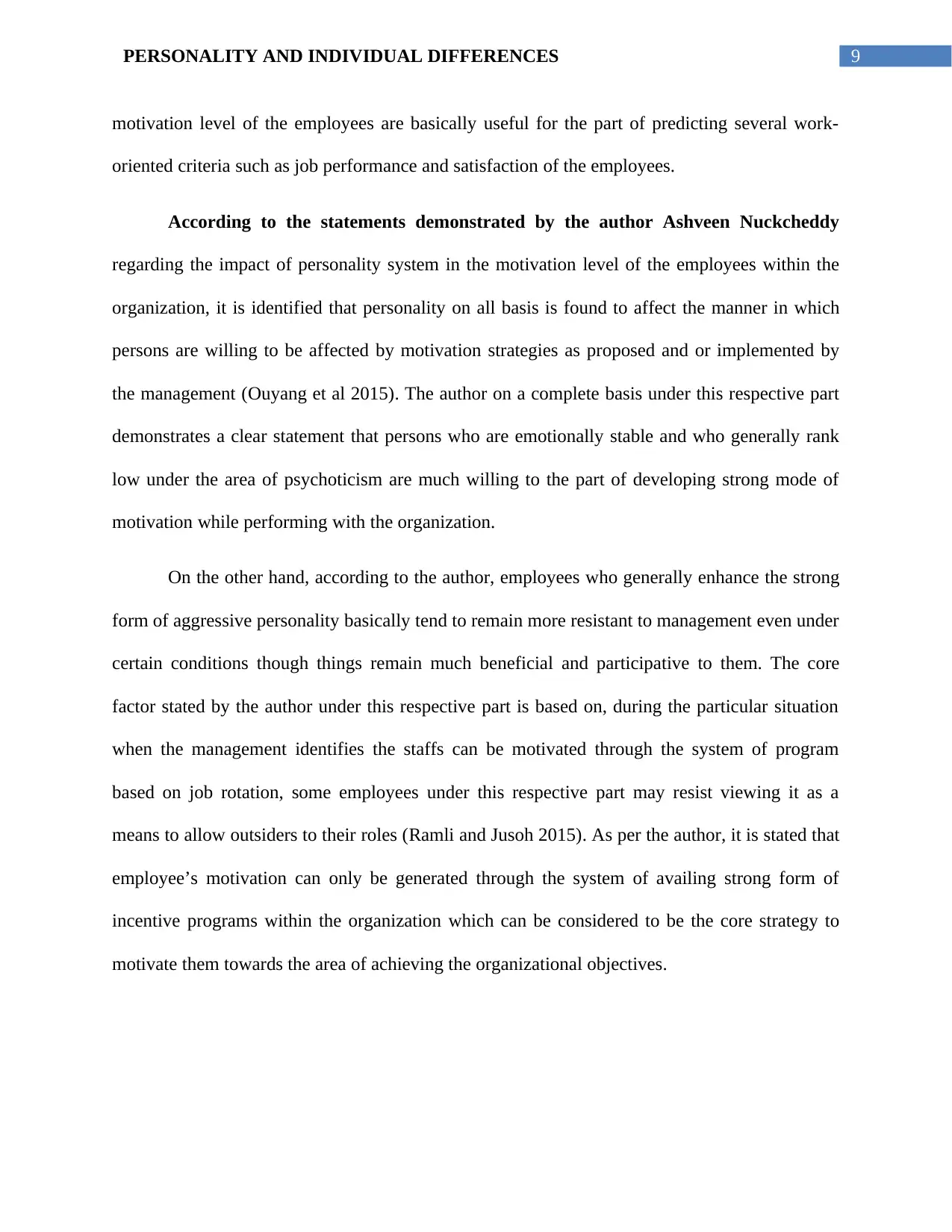
9PERSONALITY AND INDIVIDUAL DIFFERENCES
motivation level of the employees are basically useful for the part of predicting several work-
oriented criteria such as job performance and satisfaction of the employees.
According to the statements demonstrated by the author Ashveen Nuckcheddy
regarding the impact of personality system in the motivation level of the employees within the
organization, it is identified that personality on all basis is found to affect the manner in which
persons are willing to be affected by motivation strategies as proposed and or implemented by
the management (Ouyang et al 2015). The author on a complete basis under this respective part
demonstrates a clear statement that persons who are emotionally stable and who generally rank
low under the area of psychoticism are much willing to the part of developing strong mode of
motivation while performing with the organization.
On the other hand, according to the author, employees who generally enhance the strong
form of aggressive personality basically tend to remain more resistant to management even under
certain conditions though things remain much beneficial and participative to them. The core
factor stated by the author under this respective part is based on, during the particular situation
when the management identifies the staffs can be motivated through the system of program
based on job rotation, some employees under this respective part may resist viewing it as a
means to allow outsiders to their roles (Ramli and Jusoh 2015). As per the author, it is stated that
employee’s motivation can only be generated through the system of availing strong form of
incentive programs within the organization which can be considered to be the core strategy to
motivate them towards the area of achieving the organizational objectives.
motivation level of the employees are basically useful for the part of predicting several work-
oriented criteria such as job performance and satisfaction of the employees.
According to the statements demonstrated by the author Ashveen Nuckcheddy
regarding the impact of personality system in the motivation level of the employees within the
organization, it is identified that personality on all basis is found to affect the manner in which
persons are willing to be affected by motivation strategies as proposed and or implemented by
the management (Ouyang et al 2015). The author on a complete basis under this respective part
demonstrates a clear statement that persons who are emotionally stable and who generally rank
low under the area of psychoticism are much willing to the part of developing strong mode of
motivation while performing with the organization.
On the other hand, according to the author, employees who generally enhance the strong
form of aggressive personality basically tend to remain more resistant to management even under
certain conditions though things remain much beneficial and participative to them. The core
factor stated by the author under this respective part is based on, during the particular situation
when the management identifies the staffs can be motivated through the system of program
based on job rotation, some employees under this respective part may resist viewing it as a
means to allow outsiders to their roles (Ramli and Jusoh 2015). As per the author, it is stated that
employee’s motivation can only be generated through the system of availing strong form of
incentive programs within the organization which can be considered to be the core strategy to
motivate them towards the area of achieving the organizational objectives.
Paraphrase This Document
Need a fresh take? Get an instant paraphrase of this document with our AI Paraphraser
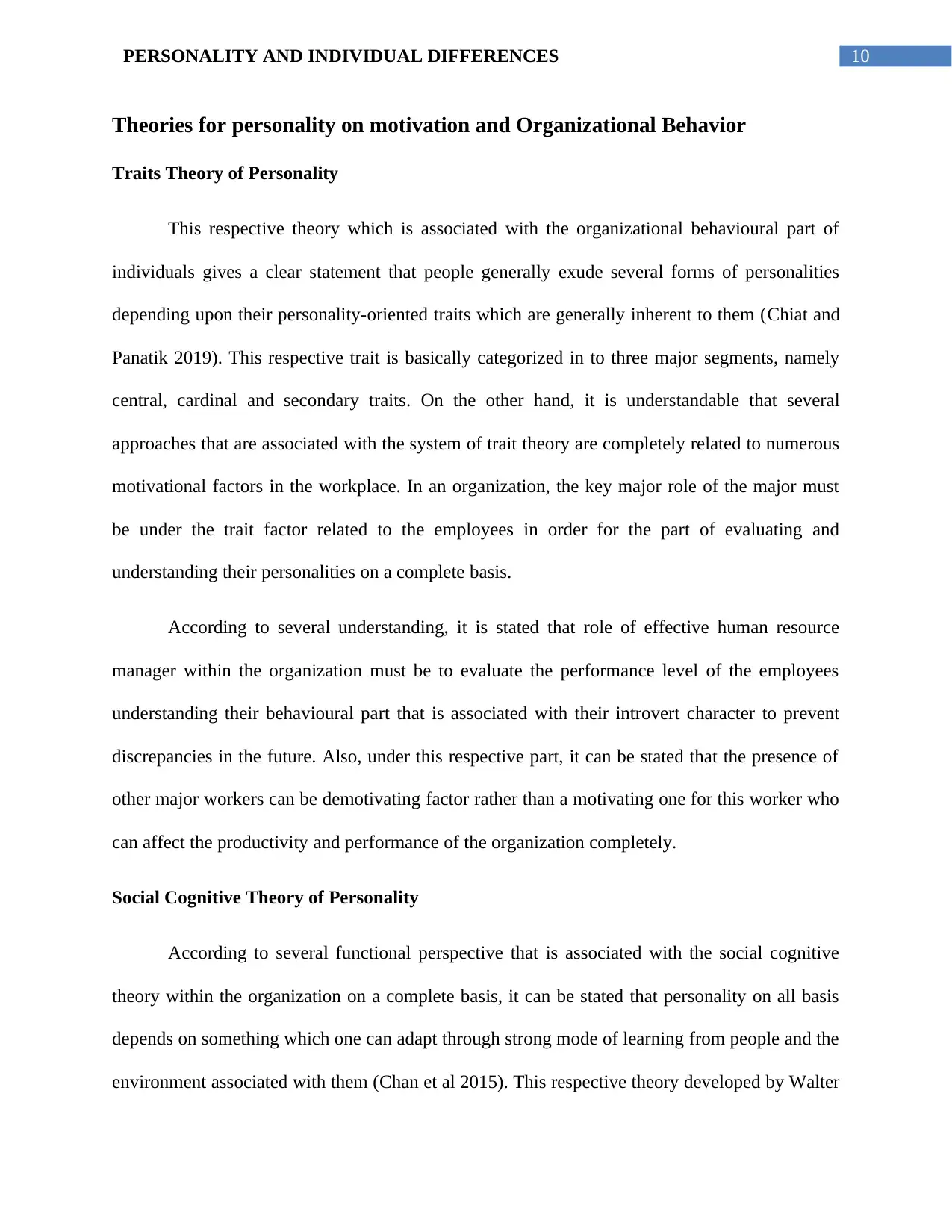
10PERSONALITY AND INDIVIDUAL DIFFERENCES
Theories for personality on motivation and Organizational Behavior
Traits Theory of Personality
This respective theory which is associated with the organizational behavioural part of
individuals gives a clear statement that people generally exude several forms of personalities
depending upon their personality-oriented traits which are generally inherent to them (Chiat and
Panatik 2019). This respective trait is basically categorized in to three major segments, namely
central, cardinal and secondary traits. On the other hand, it is understandable that several
approaches that are associated with the system of trait theory are completely related to numerous
motivational factors in the workplace. In an organization, the key major role of the major must
be under the trait factor related to the employees in order for the part of evaluating and
understanding their personalities on a complete basis.
According to several understanding, it is stated that role of effective human resource
manager within the organization must be to evaluate the performance level of the employees
understanding their behavioural part that is associated with their introvert character to prevent
discrepancies in the future. Also, under this respective part, it can be stated that the presence of
other major workers can be demotivating factor rather than a motivating one for this worker who
can affect the productivity and performance of the organization completely.
Social Cognitive Theory of Personality
According to several functional perspective that is associated with the social cognitive
theory within the organization on a complete basis, it can be stated that personality on all basis
depends on something which one can adapt through strong mode of learning from people and the
environment associated with them (Chan et al 2015). This respective theory developed by Walter
Theories for personality on motivation and Organizational Behavior
Traits Theory of Personality
This respective theory which is associated with the organizational behavioural part of
individuals gives a clear statement that people generally exude several forms of personalities
depending upon their personality-oriented traits which are generally inherent to them (Chiat and
Panatik 2019). This respective trait is basically categorized in to three major segments, namely
central, cardinal and secondary traits. On the other hand, it is understandable that several
approaches that are associated with the system of trait theory are completely related to numerous
motivational factors in the workplace. In an organization, the key major role of the major must
be under the trait factor related to the employees in order for the part of evaluating and
understanding their personalities on a complete basis.
According to several understanding, it is stated that role of effective human resource
manager within the organization must be to evaluate the performance level of the employees
understanding their behavioural part that is associated with their introvert character to prevent
discrepancies in the future. Also, under this respective part, it can be stated that the presence of
other major workers can be demotivating factor rather than a motivating one for this worker who
can affect the productivity and performance of the organization completely.
Social Cognitive Theory of Personality
According to several functional perspective that is associated with the social cognitive
theory within the organization on a complete basis, it can be stated that personality on all basis
depends on something which one can adapt through strong mode of learning from people and the
environment associated with them (Chan et al 2015). This respective theory developed by Walter
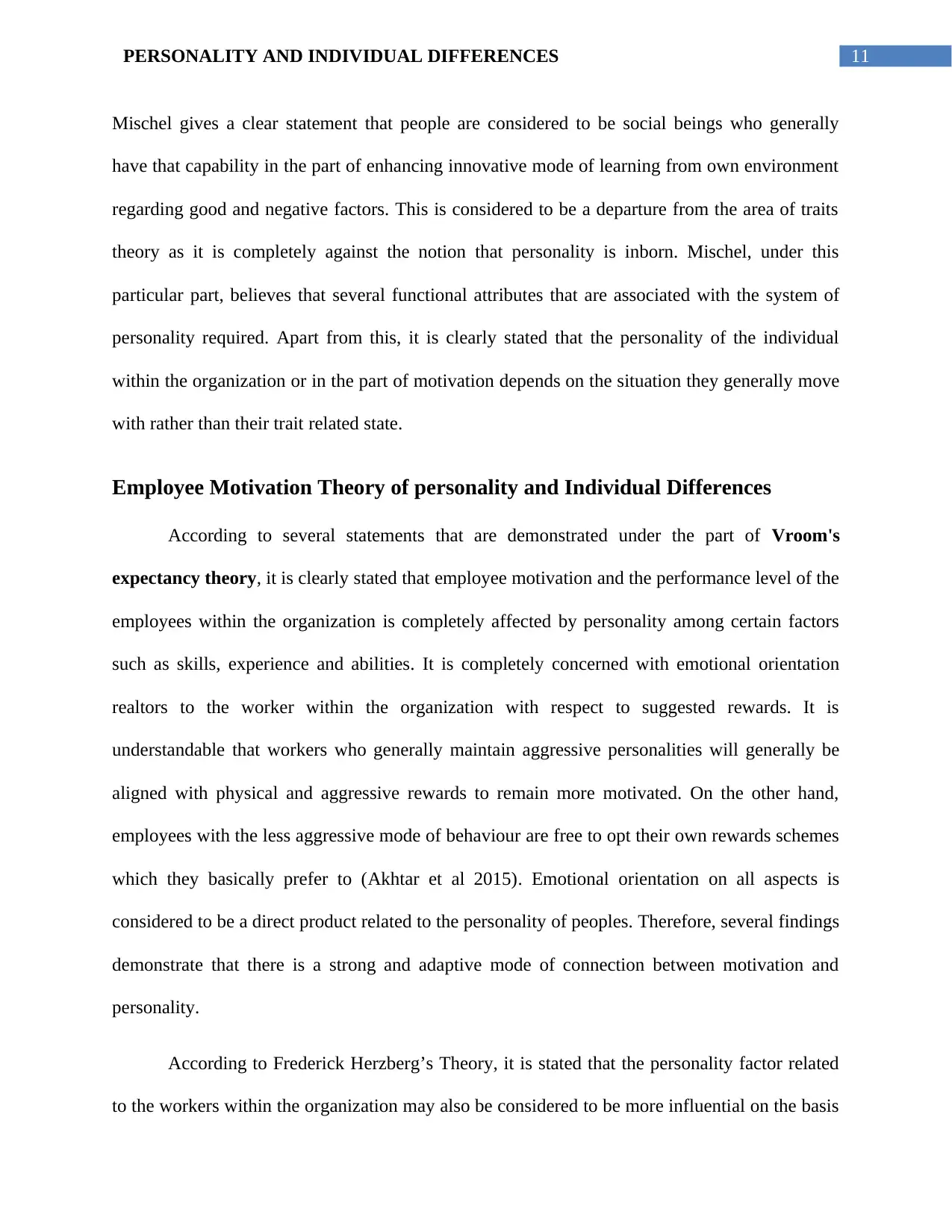
11PERSONALITY AND INDIVIDUAL DIFFERENCES
Mischel gives a clear statement that people are considered to be social beings who generally
have that capability in the part of enhancing innovative mode of learning from own environment
regarding good and negative factors. This is considered to be a departure from the area of traits
theory as it is completely against the notion that personality is inborn. Mischel, under this
particular part, believes that several functional attributes that are associated with the system of
personality required. Apart from this, it is clearly stated that the personality of the individual
within the organization or in the part of motivation depends on the situation they generally move
with rather than their trait related state.
Employee Motivation Theory of personality and Individual Differences
According to several statements that are demonstrated under the part of Vroom's
expectancy theory, it is clearly stated that employee motivation and the performance level of the
employees within the organization is completely affected by personality among certain factors
such as skills, experience and abilities. It is completely concerned with emotional orientation
realtors to the worker within the organization with respect to suggested rewards. It is
understandable that workers who generally maintain aggressive personalities will generally be
aligned with physical and aggressive rewards to remain more motivated. On the other hand,
employees with the less aggressive mode of behaviour are free to opt their own rewards schemes
which they basically prefer to (Akhtar et al 2015). Emotional orientation on all aspects is
considered to be a direct product related to the personality of peoples. Therefore, several findings
demonstrate that there is a strong and adaptive mode of connection between motivation and
personality.
According to Frederick Herzberg’s Theory, it is stated that the personality factor related
to the workers within the organization may also be considered to be more influential on the basis
Mischel gives a clear statement that people are considered to be social beings who generally
have that capability in the part of enhancing innovative mode of learning from own environment
regarding good and negative factors. This is considered to be a departure from the area of traits
theory as it is completely against the notion that personality is inborn. Mischel, under this
particular part, believes that several functional attributes that are associated with the system of
personality required. Apart from this, it is clearly stated that the personality of the individual
within the organization or in the part of motivation depends on the situation they generally move
with rather than their trait related state.
Employee Motivation Theory of personality and Individual Differences
According to several statements that are demonstrated under the part of Vroom's
expectancy theory, it is clearly stated that employee motivation and the performance level of the
employees within the organization is completely affected by personality among certain factors
such as skills, experience and abilities. It is completely concerned with emotional orientation
realtors to the worker within the organization with respect to suggested rewards. It is
understandable that workers who generally maintain aggressive personalities will generally be
aligned with physical and aggressive rewards to remain more motivated. On the other hand,
employees with the less aggressive mode of behaviour are free to opt their own rewards schemes
which they basically prefer to (Akhtar et al 2015). Emotional orientation on all aspects is
considered to be a direct product related to the personality of peoples. Therefore, several findings
demonstrate that there is a strong and adaptive mode of connection between motivation and
personality.
According to Frederick Herzberg’s Theory, it is stated that the personality factor related
to the workers within the organization may also be considered to be more influential on the basis
⊘ This is a preview!⊘
Do you want full access?
Subscribe today to unlock all pages.

Trusted by 1+ million students worldwide
1 out of 16
Related Documents
Your All-in-One AI-Powered Toolkit for Academic Success.
+13062052269
info@desklib.com
Available 24*7 on WhatsApp / Email
![[object Object]](/_next/static/media/star-bottom.7253800d.svg)
Unlock your academic potential
Copyright © 2020–2026 A2Z Services. All Rights Reserved. Developed and managed by ZUCOL.





